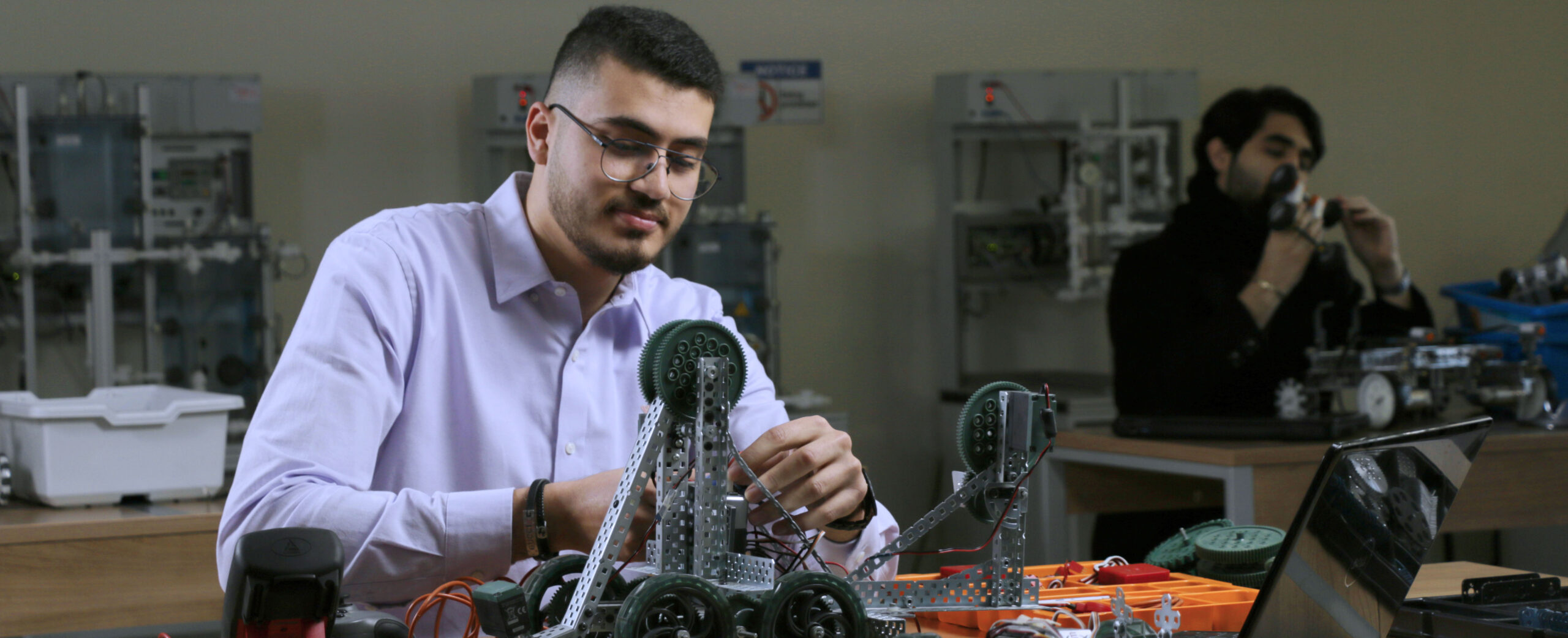
Bachelor of Science in Information Technology
Introduction
The Bachelor of Science in Information Technology (BSIT) programme prepares students to take a leading role in Information Technology by equipping them with the needed knowledge and competencies to effectively evaluate, manage, and maintain computing resources. It covers various IT domains which include information management, integrated systems, Platform technologies, System paradigm, Networking, User experience design, Software Development, Web and Mobile systems and Project Management.
The Information Technology major comprises the following concentrations:
- The Applications Development concentration provides students with the ability to program in languages typically utilised in contemporary business environments such as Python, C++, Java, C#, VB.NET, Mobile Programming, PHP and other industry-standard applications.
- The Networking and Cybersecurity concentration ensures that students apply cyber forensics, ethical hacking and acquire practical application in developing plans for security architectures considering cyber defense, cyber operations, and cyber law.
- The Data Analytics and Artificial Intelligence concentration equips the students with the knowledge and skills to acquire, curate, manage, analyze, and make inferences from data to solve real-world problems with the use of statistical and algorithmic intelligent systems.
Programme Educational Objectives
Apply knowledge to effectively analyse and assess real life problems to develop economically viable and socially acceptable IT solutions.
Demonstrate excellence in professionalism, moral and ethical conduct, interpersonal skills and adaptable communication to prevalent trends in technology and changing technology.
Work productively as successful IT professionals in diverse career paths including supportive and leadership roles on multidisciplinary teams or be active in higher studies.
Programme Intended Learning Outcomes
Analyse a complex computing problem and to apply principles of computing and other relevant disciplines to identify solutions.
Design, implement, and evaluate a computing-based solution to meet a given set of computing requirements in the context of the program’s discipline.
Communicate effectively in a variety of professional contexts.
Recognise professional responsibilities and make informed judgments in computing practice based on legal and ethical principles.
Function effectively as a member or leader of a team and engage in activities appropriate to the program’s discipline.
Use systematic approaches to select, develop, apply, integrate and administer secured computing technologies to accomplish user goals.
Programme Specification
BSIT Programme Specification Effective AY 2022-2023
Degree Facts
- Students will gain a wide range of transferrable skills relevant to employability and personal development.
- The duration of the programme is three (3) years and one (1) trimester.
- The medium of instruction in all courses is English.
- The number of credits required to graduate is 180 units.

Career Opportunities
The BSIT major in Applications Development, Networking and Cybersecurity, and Data Analytics and Artificial Intelligence graduates can work in either public or private sectors as network and system administrator, computer system analyst/manager, information security analyst/manager, computer network designer and architects, software application developer, web develop and IT business intelligence analyst. In addition they can pursue postgraduate degree in information technology and teach at universities.
Fee Structure:
BHD 25.000 (non-refundable, payable one time)
BHD 50.000 (non-refundable, payable every term)
BHD 30.000 (non-refundable, payable per term)
BHD 75.000 per credit unit
BHD 150.000 (non-refundable, payable one time)

Bachelor of Science in Accounting and Finance
Introduction
The Bachelor of Science of Accounting and Finance (BSAF) programme is designed to equip students with thorough working knowledge, skills, professional values, ethics, attitudes and the need to integrate these elements to perform the role required in the field of accounting and finance. It has strong emphasis on the application of accounting and financial expertise with ethically informed judgment into the complex contexts of the modern world.
Programme Educational Objectives
Demonstrate technical competence, professional skills, and professional values, ethics and attitude that enable them to make positive contribution to the profession and throughout their professional lives.
Employ technology as a business tool in capturing financial and non-financial information, generating reports and decision making.
Promote professionalism and high ethical standards in the field of accounting and finance disciplines that recognizes personal, corporate, and professional responsibility in global financial arena.
Programme Intended Learning Outcomes
Demonstrate detailed knowledge and understanding of principles, conventions, concepts, theories and the empirical evidence related to accounting, finance and other key functional areas of business.
Apply principles, standards, concepts, facts, and procedures on accounting and non-accounting information to perform financial, audit and taxation functions and prepare related reports.
Relate and adapt theories, concepts, principles, tools, techniques, and emerging technologies using specialized skills to provide in-depth and creative business solutions to different aspects of accounting, finance and business operations.
Critically evaluate/process information from reliable sources and perspective through research & analysis, statistics, and integrations when making decisions.
Use technology, analytical tools, and quantitative skills to manipulate data, evaluate, estimate, interpret, and model business problems, functions, and phenomena to solve problems in the dynamic global business environment.
Communicate information, ideas, problems, and problems related to accounting, finance, with high degree of proficiency verbally and/or in writing for the intended audience.
Demonstrate a capacity to lead a group and/or manage projects showing high ethical standards needed for reporting of financial and accounting information.
Programme Specification
BSAF Programme Specification Effective AY 2022-2023
Degree Facts
- Students will gain a wide range of transferrable skills relevant to employability and personal development.
- The duration of the programme is three (3) years and one (1) trimester.
- The medium of instruction in all courses is English.
- The number of credits required to graduate is 180 credit units.

Careers Opportunities
The BSAF graduates can have work along accounting, auditing, financial controls, investment analysis, risk management, Sharia compliant accounting standards, public practice accounting, tax and regulatory services, compliance services, cost management, corporate management, data analytics, and financial services. In addition, they can pursue postgraduate degrees in MBA and DBA or PhD in Accounting, and obtain professional qualifications such as such as CIMA, ACCA, CPA, CA, CFA, and CIA.
Fee Structure:
BHD 25.000 (non-refundable, payable one time)
BHD 50.000 (non-refundable, payable every term)
BHD 30.000 (non-refundable, payable per term)
BHD 75.000 per credit unit
BHD 150.000 (non-refundable, payable one time)

Bachelor of Science in Environmental Engineering
Introduction
The Bachelor of Science in Environmental Engineering (BSEnE) governs the interrelationships of man and nature along with the processes that impact the balance of our desire to achieve sustainable growth while maintaining desirable environmental quality. It covers areas of mathematics, basic sciences (physical, chemical and biological), engineering design and analysis, and environment management and regulations necessary to address complex environmental engineering problems.
Programme Educational Objectives
Pursue careers in Environmental Engineering or related fields towards the improvement of engineering practice.
Engage in lifelong learning towards completion of advanced/continuing education/industrial training or other learning opportunities.
Demonstrate professional success via promotions and/or positions of increasing responsibility.
Programme Intended Learning Outcomes/Student Outcomes
Identify, formulate, and solve complex engineering problems by applying principles of engineering, science, and mathematics.
Apply engineering design to produce solutions that meet specified needs with consideration of public health, safety, and welfare, as well as global, cultural, social, environmental, and economic factors.
Communicate effectively with a range of audiences.
Recognize ethical and professional responsibilities in engineering situations and make informed judgments, which must consider the impact of engineering solutions in global, economic, environmental, and societal contexts.
Function effectively on a team whose members together provide leadership, create a collaborative and inclusive environment, establish goals, plan tasks, and meet objectives.
Develop and conduct appropriate experimentation, analyse and interpret data, and use engineering judgment to draw conclusions.
Acquire and apply new knowledge as needed, using appropriate learning strategies.
Programme Specification
BSEnE Programme Specification Effective AY 2022-2023
Degree Facts
1. Students will gain a wide range of transferable skills relevant to employability and personal development.
2. The duration of the programme is four (4) years.
3. The medium of instruction in all courses is English.
4. The number of credits required to graduate is 204 units.

Career Opportunities
The BSEnE graduates can pursue a career as test field engineer, environmental impact assessor, pollution control officer, environmental consultant, environmental health safety director, water project manager, wastewater engineer, water quality control director, recycling products manager/engineer, hazardous waste test engineer, air quality inspector, biotech remediation project scientist, green building engineer, and environmental project engineer. In addition, the programme can lead graduates for postgraduate degrees in related engineering fields.
Fee Structure:
BHD 25.000 (non-refundable, payable one time)
BHD 50.000 (non-refundable, payable every term)
BHD 30.000 (non-refundable, payable per term)
BHD 75.000 per credit unit
BHD 150.000 (non-refundable, payable one time)

Bachelor of Science in Mechatronics Engineering
Introduction
The Bachelor of Science in Mechatronics Engineering (BSME) combines mechanical, electronic, electrical, and computer engineering. It is an interdisciplinary scientific area focusing on the study and design of intelligent programmable systems from an engineering perspective and looks into the design, development and controlling of advanced hybrid systems.
Programme Educational Objectives
Pursue careers in Mechatronics Engineering or related fields towards the improvement of engineering practice.
Engage in lifelong learning toward completion of advanced/continuing education or other learning opportunities.
Demonstrate professional success through strengthened networks and/or positions of increasing social responsibility.
Programme Intended Learning Outcomes/Student Outcomes
Identify, formulate, and solve complex engineering problems by applying principles of engineering, science, and mathematics.
Apply engineering design to produce solutions that meet specified needs with consideration of public health, safety, and welfare, as well as global, cultural, social, environmental, and economic factors.
Communicate effectively with a range of audiences.
Recognize ethical and professional responsibilities in engineering situations and make informed judgments, which must consider the impact of engineering solutions in global, economic, environmental, and societal contexts.
Function effectively on a team whose members together provide leadership, create a collaborative and inclusive environment, establish goals, plan tasks, and meet objectives.
Develop and conduct appropriate experimentation, analyze and interpret data, and use engineering judgment to draw conclusions.
Acquire and apply new knowledge as needed, using appropriate learning strategies.
Programme Specification
BSME Programme Specification Effective AY 2022-2023
Degree Facts
- Students will gain a wide range of transferable skills relevant to employability and personal development.
- The duration of the programme is four (4) years.
- The medium of instruction in all courses is English.
- The number of credits required to graduate is 204 units.

Career Opportunities
The BSME graduates can pursue a career as production engineer, instrumentation engineer, production/manufacturing supervisor, PLC programmer, design engineer, vocational instructor/trainer, laboratory engineer, maintenance supervisor, or sales engineer. In addition, the programme can lead graduates for postgraduate degrees in engineering.
Fee Structure:
BHD 25.000 (non-refundable, payable one time)
BHD 50.000 (non-refundable, payable every term)
BHD 30.000 (non-refundable, payable per term)
BHD 51.500 PER CREDIT UNIT
BHD 150.000 (non-refundable, payable one time)

Bachelor of Science in Informatics Engineering
Introduction
The Bachelor of Science in Informatics Engineering (BSIE) combines computer technology with engineering concepts. It is an interdisciplinary scientific area focusing on the application of advanced computing, information and communication technologies to engineering. It covers the design and development of intelligent engineered products and processes enabled by the integration of computer, control systems and software engineering technologies.
Programme Educational Objectives
Pursue careers in Informatics Engineering or related fields towards the improvement of engineering practice.
Engage in lifelong learning toward completion of advanced/continuing education or other learning opportunities.
Demonstrate professional success through strengthened networks and/or positions of increasing social responsibility.
Programme Intended Learning Outcomes/Student Outcomes
Identify, formulate, and solve complex engineering problems by applying principles of engineering, science, and mathematics.
Apply engineering design to produce solutions that meet specified needs with consideration of public health, safety, and welfare, as well as global, cultural, social, environmental, and economic factors.
Communicate effectively with a range of audiences.
Recognize ethical and professional responsibilities in engineering situations and make informed judgments, which must consider the impact of engineering solutions in global, economic, environmental, and societal contexts.
Function effectively on a team whose members together provide leadership, create a collaborative and inclusive environment, establish goals, plan tasks, and meet objectives.
Develop and conduct appropriate experimentation, analyze and interpret data, and use engineering judgment to draw conclusions.
Acquire and apply new knowledge as needed, using appropriate learning strategies.
Programme Specification
BSIE Programme Specification Effective AY2022-2023
Degree Facts
- Students will gain a wide range of transferable skills relevant to employability and personal development.
- The duration of the programme is four (4) years.
- The medium of instruction in all courses is English.
- The number of credits required to graduate is 204 units.

Career Opportunities
The BSIE graduates can pursue a career as network engineer, control engineer, network analyst/administrator, production engineer, systems developer, computer/software engineer, sales engineer, technical instructor/trainer. In addition, the programme can lead graduates for postgraduate degrees in engineering.
Fee Structure:
BHD 25.000 (non-refundable, payable one time)
BHD 50.000 (non-refundable, payable every term)
BHD 30.000 (non-refundable, payable per term)
BHD 51.500 PER CREDIT UNIT
BHD 150.000 (non-refundable, payable one time)

Bachelor of Science in Computer Science
Introduction
The Bachelor of Science in Computer Science (BSCS) programme involves the understanding of concepts, principles, applications, and technologies of computing. It focuses on the study of data structures and algorithms, computer architecture, operating systems, survey of programming languages and techniques in programming. It includes advanced topics in computing, but not limited to human computer interaction, data mining, enterprise architecture, artificial intelligence, mobile computing and animation in addition to a set of elective courses.
Programme Educational Objectives
Apply knowledge to effectively analyze and assess real life problems to develop economically viable and socially acceptable computing solutions.
Demonstrate excellence in professionalism, moral and ethical conduct, interpersonal skills and adaptable communication to prevalent trends in technology and changing technology
Work productively as successful computer professionals in diverse career paths and/or pursue actively advanced degrees in related disciplines.
Programme Intended Learning Outcomes
Analyze a complex computing problem and to apply principles of computing and other relevant disciplines to identify solutions.
Design, implement, and evaluate a computing-based solution to meet a given set of computing requirements in the context of the program’s discipline.
Communicate effectively in a variety of professional contexts.
Recognize professional responsibilities and make informed judgments in computing practice based on legal and ethical principles.
Function effectively as a member or leader of a team engaged in activities appropriate to the program’s discipline.
Apply computer science theory and software development fundamentals to produce computing-based solutions
Programme Specification
BSCS Programme Specification Effective AY 2022-2023
Degree Facts
- The programme provides students with concepts and theories in programming, Internet and data communications, digital design, databases, data structures, system analysis and design and algorithm analysis, project management and design and practices in computing.
- It further equips students to practice skills in programming, database design, system and mobile applications development and mobile programming.
- It provides a range of transferable skills that prepare students for work.
- It requires students to complete 198 credits.
- The courses in the curriculum are taught in English.

Career Opportunities
The BSCS graduates can have work after graduation along programming, database design and management, networking, web development, multimedia development, computer graphics and animation, mobile applications development and project management. In addition, the programme can lead graduates for postgraduate degrees in computing.
Fee Structure:
BHD 25.000 (non-refundable, payable one time)
BHD 50.000 (non-refundable, payable every term) Technology Fee
BHD 30.000 (non-refundable, payable per term)
BHD 51.500 PER CREDIT UNIT
BHD 150.000 (non-refundable, payable one time)

Master of Business Administration
Introduction
The MBA Programme is an advanced business education which provides learning experience that incorporates functional areas in accounting, finance, marketing, and management to become effective managers and leaders of business organizations in a globally competitive and complex business environment.
Programme Educational Objectives
Practice effectively as management professionals by demonstrating competency in the key business functional areas and applying critical thinking, analysis and problem-solving skills to develop, implement, and evaluate solutions in complex business and economic problems requiring interdisciplinary and global perspectives.
Promote high ethical standards and professionalism by evaluating the moral, social, and environmental implications of managerial decisions and understanding the relationship between business organizations and other societal institutions.
Programme Intended Learning Outcomes
Demonstrate critical knowledge and understanding of the key functional areas of business that are needed by a business manager.
Critically analyze tools and models using various management techniques that deliver a more efficient strategic decision-making process to solve complex business problems.
Initiate, communicate and lead cooperative activities to enhance entrepreneurial skills that address the need of globalization.
Demonstrate the expertise required to perform independent research in the field of business and management by applying appropriate methodologies
Pursue life-long learning and promote ethical and professional behavior by taking responsibility for their work.
Degree Facts
- Graduate students will gain a wide range of high-order thinking skills and transferable skills relevant to business administration, employability and personal development.
- The duration of the programme is two (2) years.
- The medium of instruction in all courses is English.
- The number of credits required to graduate is 42 units.

Careers Opportunities
The graduates of the MBA programme can pursue a career as business development manager, business analyst/specialist, HR manager, bank and finance managers, financial advisers, risk and project managers, operations manager or managing their own business as entrepreneurs. In addition, the programme can lead graduates for postgraduate degrees in business and management such as PhD or DBA.
Fee Structure:
BHD 25.000 (non-refundable, payable one time)
BHD 50.000 (non-refundable, payable every term)
BHD 30.000 (non-refundable, payable per term)
BHD 90.125 PER CREDIT UNIT
BHD 750.000 (non-refundable and paid upon registration of the thesis course)
BHD 150.000 (non-refundable, payable one time)

Bachelor of Science in International Business
Introduction
The Bachelor of Science in International Business (BSIB) programme provides knowledge and skills required to manage international and global business affairs. The programme intends to develop students with skills and competencies necessary to understand the dynamics of the international dimension of economics, banking and finance, and marketing. The programme also endeavors to prepare the students to obtain potentials leading to management positions and employability in general.
Programme Educational Objectives
Possess the relevant knowledge, skills, and entrepreneurial mindset to respond proactively and creatively to contemporary business issues and challenges of the global business environment.
Engage and succeed in international business careers through a range of intellectual, professional attributes and transferable skills such as commercial acumen, research, teamwork, ethical behavior, proactive involvement, and effective communication.
Transfigure Knowledge, understanding and academic skills through postgraduate study and/or continuing professional developments.
Programme Intended Learning Outcomes
Demonstrate critical knowledge and understanding of the characteristics, functions, processes of business organizations, management of risks, and economies in the global contexts.
Critically relate and adapt business related theories, models, concepts, and approaches to address complex business problems and changing nature of business at national and global level.
Use a broad range of approaches to provide in-depth business solutions related to domestic and international business operations and strategy, cross culture management, public policy domains and ethical standards.
Critically analyze and evaluate the contemporary organizations, their practices, and the major business issues to make and communicate effective decisions.
Formulate creative business solutions to business problems or opportunities using latest thinking, theories, and frameworks in best business practices.
Use technology, investigative methods, quantitative skills, analytical tools, and specialized application in a manner that contributes to the effective management and execution of a range of tasks.
Communicate using appropriate style and presentation about the specialized topics related to international business for the intended audience.
Manage and lead diverse groups in developing solutions to complex problems and issues.
Degree Facts
- Students will gain a wide range of transferable skills relevant to employability and personal development.
- The duration of the programme is three (3) years and 1 trimester.
- The medium of instruction in all courses is English.
- The number of credits required to graduate is 180 units.

Careers Opportunities
The graduates of the BSIB programme can pursue a career as financial analyst, sales manager, stock broker, international trader, product manager, management analyst/consultant, economist, business development manager, Foreign Service officer, trade specialist, finance controller, import/export coordinator, marketing manager, public relations specialist, advertising executive, human resources manager, or entrepreneur. In addition, the programme can lead graduates for postgraduate degrees in business such as MBA or MSc in Business Management.
Fee Structure:
BHD 25.000 (non-refundable, payable one time)
BHD 50.000 (non-refundable, payable every term)
BHD 30.000 (non-refundable, payable per term)
BHD 51.500 PER CREDIT UNIT
BHD 150.000 (non-refundable, payable one time)

Bachelor of Science in Business Informatics
Introduction
The Bachelor of Science in Business Informatics (BSBI) programme provides in-depth knowledge and skills required to evaluate, implement, use and manage information systems in organizations. The programme produces graduates with solid business background who understand the role of information systems in improving efficiency and effectiveness of organizations; and who are able to bridge the gap between business and information technology area.
Programme Educational Objectives
Possess expertise in systems thinking in order to use, choose, develop, and manage information and communications technology (ICT) solutions which enable enterprise development and business process improvement and innovation.
Engage in productive careers in business informatics areas of expertise while being a responsive member of a business organisation and society with awareness of professional ethics, responsibilities, values and standards.
Transfigure knowledge, understanding and academic skills through postgraduate study and/or continuing professional development.
Programme Intended Learning Outcomes
Demonstrate advanced knowledge and skills in the practical and logical foundations of informatics and the business functional areas and their processes.
Demonstrate critical knowledge and understanding of the different information systems in business organisations, their concepts, principles, frameworks, models, design and development tools, requirements, methodologies, and standards.
Use advanced and some specialist level skills to develop and design information systems and adapt suitable business applications for management decision making and in meeting business needs.
Use a range of approaches to critically analyse, evaluate, and synthesise data and information in formulating solutions to business problems and issues.
Utilise specialist-level skills in dealing with complex business situations and problems through IT projects, research, and in benchmarking organisational best practices in improving and innovate business processes, operations, and organisational systems.
Apply a range of approaches to critically analyse and evaluate information systems and applications and business models to identify, define, and interpret situations and implement relevant solutions.
Communicate clearly, effectively, and successfully with peers, colleagues, and specialists in conveying and presenting complex information, ideas, and projects with the use of appropriate tools, techniques, and technology.
Operate and function effectively as an individual or member/leader of a team or organisation with the value of recognising the need for responsibility and engagement in life-long learning; and promote ethical and professional behavior in organisations and society.
Degree Facts
- Students will gain a wide range of transferable skills relevant to employability and personal development.
- The duration of the programme is three (3) years and 1 trimester.
- The medium of instruction in all courses is English.
- The number of credits required to graduate is 180 units.

Careers Opportunities
The graduates of BSBI programme can pursue a career as online marketing analyst, business analyst, software applications developer, information security analyst, computer systems analyst, database administrator, management analyst, web application developer, e-commerce developer, management consultant, project manager, quality assurance manager, video production manager or entrepreneur. In addition, the programme can lead graduates for postgraduate degrees in business such as MBA or MSc in Management Information Systems.
Fee Structure:
BHD 25.000 (non-refundable, payable one time)
BHD 50.000 (non-refundable, payable every term)
BHD 30.000 (non-refundable, payable per term)
BHD 51.500 PER CREDIT UNIT
BHD 150.000 (non-refundable, payable one time)